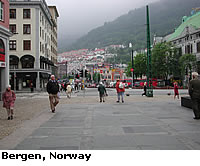Norway submits response to ERA to Commission
In its response to the European Commission's communication on the proposal for establishing a European research area (ERA), Norway has pledged its support to the idea and provided suggestions which it feels could enhance it. These relate largely to an increased focus on mobility, strengthened cooperation and avoidance of excessive bureaucracy. Norway has already taken some positive steps on its own with regard to some of the ideas contained within the communication. For example, in the proposed networking European centres of excellence, Norway has already set about establishing and linking its own centres of excellence (see RCN 17042) as well as taking the first steps towards virtual centres of excellence. It also endorses the key role that these centres could play in promoting long term research. Norway supports this model and the proposed mapping of centres of excellence. It also lends its support to the definition of centres of excellence given by a CREST working group, that it should be 'a centre of cutting edge research in emerging fields with emphasis on innovation.' In this context, Norway highlights that in certain areas, such as arctic, marine and energy research, it has the expertise and facilities which could provide potential centres of excellence. Cross border research and cooperation is also key and Norway favours this element of the ERA communication. But it warns against setting up new fora for coordination and consultation as this 'might result in bureaucratisation and also reduced independence for the different organisations.' It also suggests that more scrutiny be given to which type of programmes are the most suited to this form of cooperation. On the benchmarking element of the ERA, Norway clearly states that it would like to be part of this process, but cautions that this would be best undertaken on a limited basis, with just a restricted number of priority areas benchmarked. This would ward against the process becoming too time consuming and complicated, the paper says. Mobility is highlighted in the Norwegian paper as 'crucial for the development of a true European research area.' It gives attention to the efforts that Norway is making to bring about greater mobility on a national basis and points out that 'initiatives at a national level to strengthen mobility of researchers are important to further initiatives at European level.' Particularly important is getting mobility between universities and industry and also ensuring that there are opportunities for young people to move freely. The Norwegians even forward the suggestion that all PhD students should, as a rule, spend part of their recruitment period abroad. It also advocates closer cooperation with the educational sector, to ensure that more progress is made on getting young people interested in science and research. And it welcomes the ERA communication's mentioning of addressing the role of women in science and suggests the development of some indicators on the integration of women researchers, which would help to raise awareness on the issue. Mobility needs to work in all directions to be effective and for this reason, the Norwegian paper highlights that European research needs to become more attractive for those outside of Europe. 'Making European laboratories attractive to researchers from countries all over the world will also be important for the strengthening of the European research base and for creating links with research communities in countries outside Europe. Finally, the Norwegian paper draws attention to the ethical element of research and it welcomes the European Commission's initiatives in this area. It suggests that these could be enhanced by incorporating the work of UNESCO's world commission on the ethics of scientific knowledge and technology (COMEST).

